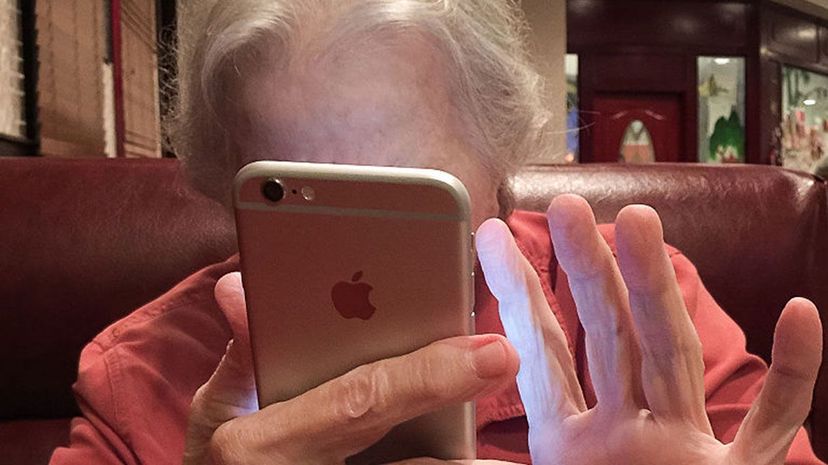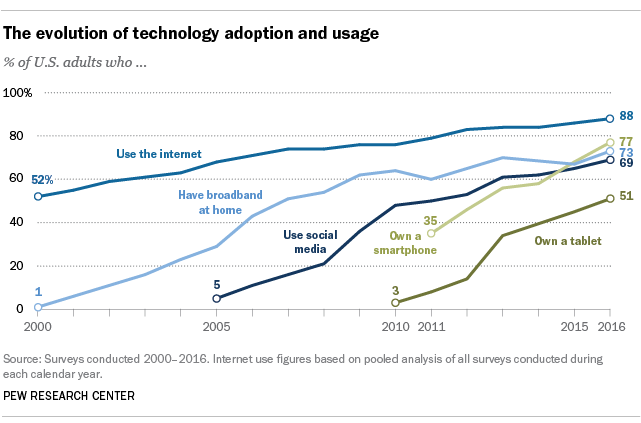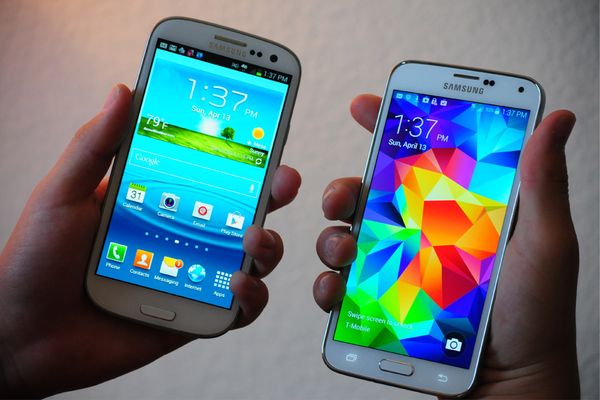
It took a long time for my 69-year-old mother to break down and get a smartphone — "They're too expensive." "Who am I texting, anyway?" — but since buying her secondhand iPhone two years ago, she's barely put it down. Word Crack, a Boggle-like word game, is her aptly named drug of choice. But she also uses her phone's tiny screen to read books borrowed digitally from the library (a book-a-day habit) and, of course, to FaceTime with the grandkids.
My mother-in-law is in the same boat. She can tell you the local weather forecast where each of her seven children (plus 26 grandchildren) live because she compulsively checks the weather app on her smartphone. Then there's the constant stream of social media notifications from Facebook, Instagram and GroupMe. Ding, ding and ding.
Advertisement
Millennials are supposed to be the ones addicted to their smartphones, not senior citizens (sorry, Mom, but you do ask for the discount at the movies). But as more and more gray-haired Americans buy and use smartphones, are they becoming just as dependent on their digital devices?
In January 2017, the Pew Research Center released the latest numbers on smartphone adoption in the United States. More than three-quarters of American adults (77 percent) now own a smartphone, but the fastest growing demographic is people over 50, 74 percent of whom now own a device. That's up 16 percentage points from just two years ago. Smartphone ownership for Americans 65 and older is at 42 percent today, up 12 points from 2015.
A spike in smartphone adoption is one thing, but what about the relationship that seniors have with their devices? Is it healthy? Back in 2015, when Pew asked Americans of varying ages to "describe" their smartphone, seniors gave overwhelmingly positive answers. Monica Anderson is a research associate at Pew and helped analyze the 2015 survey data.
"Older Americans were more likely to describe their phone as something that connected them to other people as opposed to it being a distraction," Anderson says. "They were also less likely than younger groups to say they used their phone out of boredom."
Much has changed since Pew asked those questions in 2015. Now that smartphone adoption among Baby Boomers and seniors has spiked, will they pick up the same bad attitudes and bad habits as text-obsessed teens and social-media-enslaved millennials?
Dr. David Greenfield is the founder of the Center for Internet and Technology Addiction and an assistant clinical professor of psychiatry at the University of Connecticut School of Medicine. He wrote the prescient book "Virtual Addiction" way back in 1999 and is a leading expert on internet addiction, gaming addiction and smartphone addiction. He says that older Americans are just as susceptible to the neurological triggers and traps of addictive behavior.
"I have many patients who are in their late 50s and 60s, and a few older," Greenfield says. "Based on [the Pew] statistics, it's likely that you'll see more people get into trouble with it. But I don't think you'll see the numbers become equivalent to the millennials."
The older tech-addicted or tech-abusing patients that Greenfield sees in his clinic tend to be turning to the unrestrained access of their smartphones to feed offline addictions like shopping, gambling, stock trading and pornography. This is different than younger patients who are more likely to struggle with addictions to social media and gaming, which don't have offline equivalents.
Still, Greenfield says, the smartphone has been designed to push buttons in the brain that can easily lead to compulsive behavior and even addiction in people of all ages.
"The smartphone is the world's smallest slot machine," says Greenfield. "Every time you go online, you don't know what you're going to find. You don't know what kind of social media update is going to be there, what deal on shopping, what your sports score is going to be, your stock price, or what emails or texts are going to be there."
Your brain is wired to release a pleasurable shot of dopamine when you find something novel and exciting. So, every time you hear the "ding" of a smartphone notification, Greenfield says it's a green light to your brain that a dopamine boost might be right around the corner, like waiting to see if that third cherry falls into place on a slot machine.
"That's why people check their phones a hundred times a day," Greenfield says. "It's incredibly addictive. Incredibly addictive."
Both Greenfield and Anderson from Pew say that we don't have enough data yet to determine with any certainty that older Americans are anywhere near 20-somethings in their level of smartphone use (or abuse). Anderson says that Pew is currently working on a follow-up survey specifically about seniors and mobile technology.
It's also tempting to dismiss smartphone addiction as a harmless if annoying compulsion. So what if grandma checks her Facebook feed during dinner? Your teenager has been doing it for years. But there are situations in which the compulsive need to check your phone can turn deadly — distracted driving.
In 2014, 3,179 people were killed in accidents caused by distracted driving and 431,000 were injured. Statistics show that young people are far more likely to text or email while driving, but they're not the only ones engaging in this risky behavior.
A 2012 survey by the National Highway Traffic Safety Administration found that 2.2 percent of people 65 and older who were in a crash in the prior year reported reading a text or email at the time of the accident. For 18- to 20-year-olds, that number was 3.3 percent, but as many as 8.2 percent were sending a text when they got into a crash.
Greenfield explains that young people are more likely to engage in risky behavior like distracted driving because their prefrontal cortex — the part of the brain that has to do with judgment and using past experiences to make decisions — is not fully developed until the mid-twenties.
"But our research shows that almost everybody uses their smartphone while they drive in ways that are risky, even though they know it's dangerous. We see the same behavior in adults and older adults who have the neurological capacity to make good executive decisions," says Greenfield.
Add in the fact that older people generally have slower reflexes and response times than youngsters, and we could have a growing problem on our hands.
Advertisement


